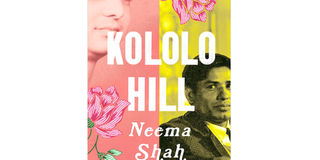Gripping work of fiction revisits dark days in ‘72

What you need to know:
Kololo Hill, a work of historical fiction, details the effects of Amin’s decree on one Indian household with family members called Motichand, Jayaben (Jaya), Pranbhai (Pran), Ashaben (Asha) and Vijaybhai (Vijay)
Book Title: Kololo Hill
Author: Neema Shah
Year of Publication: 2021
Pages: 341
Price: €10.99
Where: Amazon.com
PHILIP MATOGO
On August 4, 1972, the 47-year-old President of Uganda Idi Amin ordered the expulsion of Uganda’s Indian minority, giving them 90 days to leave the country.
Thereupon, when they were sure Amin was not going to change his mind, Ugandan “Asians” of Indian extraction started counting their losses as they boarded airplanes. Some went back to India; others to Europe, USA, and Canada as others took evacuation flights to Stansted airport in Essex, 42 miles northeast of Central London, United Kingdom.
Kololo Hill, a work of historical fiction, details the effects of Amin’s decree on one Indian household with family members called Motichand, Jayaben (Jaya), Pranbhai (Pran), Ashaben (Asha) and Vijaybhai (Vijay).
They live in a house prettily perched on Kololo Hill, a vantage point which affords them opportunity to literally look down on the rest of Kampala and, by extension, metaphorically speaking, on the rest of Uganda too. That’s because Kololo has and still is an exclusive enclave for Uganda’s richest residents, citizens or foreigners.
Newlyweds Pran and Asha; Pran’s parents Jaya and Motichand, his younger brother Vijay and house help December see their lives going from cushy to prickly as their bubble of existence bursts when Amin issues his fateful decree.
Amidst a curfew, in force after Amin’s coup d’état toppled President Milton Obote, who was flying home from the Commonwealth Heads of Government conference in Singapore on January 25, 1971, the family must survive.
Ordered to leave the country in 90 days, they are faced with the daunting prospect of leaving the only home they have ever known. They cannot take anything material with them because Amin’s marauding soldiers have gone on a looting spree targeted at the Asians who have milked the Ugandan economy.
It is a race against time, one strewn with murder, rape and all manner of extrajudicial abuse.
As the clock winds down to the Indian expulsion, we get a rare glimpse of how privileged Indians lived in 1970s Uganda. Not all of them were, however, as fabulously rich as we would assume.
Motichand’s “dukan” (shop) is struggling and that is why Pran and Vijay have to find creative means, which include profit repatriation on behalf of other Indian businesspersons. This is done under the shroud of secrecy to the extent that Motichand does not know; actually it is only Pran and Vijay who know what they are doing to bolster the dukan.
Secrets, secrets and more secrets thus insinuate themselves between the otherwise tight pairing of Pran and Asha.
Being his wife, Asha believes Pran should share everything with her. But upon realising that the clandestinity of Pran’s and Vijay’s activities is kept from her, she is understandably livid.
The growing tension between the newlyweds is one subplot. It adds to the dicey nature of Pran and Vijay’s attempts to save the family business.
As it is, the two dutiful sons are carrying out excursions to the United Kingdom in order to keep the Dukan in the black and this risks both their lives.




